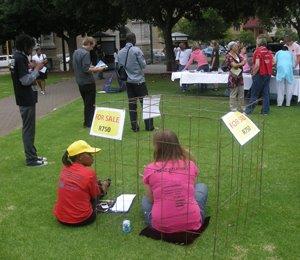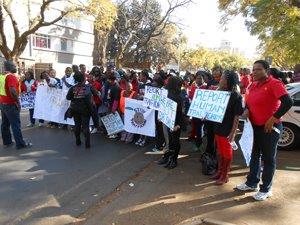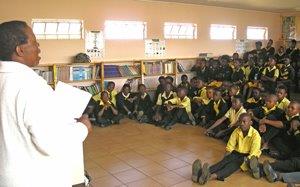I happy! I go jail, no work.
July 27, 2015
These are not the words uttered by any normal young woman. No one usually prefers going to jail to going to work.
 |
| Combatting Human Trafficking Campaign in Pretoria |
Malee* was brought to Mercy House – a shelter for victims of domestic violence and victims of human trafficking run by the Mercy Sisters in Pretoria - by officials of the Department of Home Affairs. She had been arrested three days before during a police raid on a brothel in Rustenburg, 110 km west of Pretoria. Malee could not produce her passport or visa, and, along with three other young women, was put into prison. After the officials had interviewed these women, they realized that they had been trafficked into South Africa by a Thai woman and her South African husband.
Two days before her arrest, Malee had arrived in South Africa believing that she would be using her skills in genuine work. She had completed her studies and passed with excellent marks. She was so proud of herself, and she planned to send money to her elderly parents back home. From the airport she was taken straight to the brothel and was told how much she owed the “boss” and in crude terms was informed about the “work” she would be doing. She was horrified. She screamed and cried. She fought and shrieked. The mamasan decided that Malee could not work that night.
 |
| Awareness Campaign - UN World Day Against Trafficking in Persons |
This is only one of the stories of the women we have sheltered at Mercy House. We have over 300 more: stories that can be very different, but at the centre of each are pain, degradation, disappointment and deception.
In 2004, Mercy House was asked to partner with the International Organisation of Migration in the protection of trafficked women who were awaiting repatriation. Since then, just over 300 women from Thailand, China, Nigeria, the Cameroons, Mozambique, Zambia, Zimbabwe, Malawi, Swaziland, Lesotho, Rwanda and South Africa have found shelter with us. Most of these women were used in the sex trade. Others were sold into forced marriages, used in domestic servitude and unpaid labour in hair salons and other businesses.
Our staff has facilitated awareness workshops in schools and for various women’s groups across Gauteng Province. We have also facilitated training workshops for social workers, youth workers, field workers and church groups.
 |
| Human Trafficking Awareness with Primary School Children |
Working on the ground with the victims brings joy and heartache. It is so heartening to see women regain self-confidence, to be able to face the world again and to learn to trust again. Helping them to make decisions about their future also brings joy. At the same time, it is difficult to witness the harm that has been done to some of them. Nightmares, bed-wetting, anger, anxiety: all have to be patiently tolerated by the staff members of the shelter. In this work the housemothers are the real heroines.
But, no matter what the challenges are, the gratitude expressed by most of the survivors helps us to keep going - happily. Cost does not count when a woman leaves the shelter to return home, and with tears running down her cheeks, hugs each member of staff and says: “Thank you for loving me.”
- Colleen Wilkinson rsm, South Africa
*Not her real name

